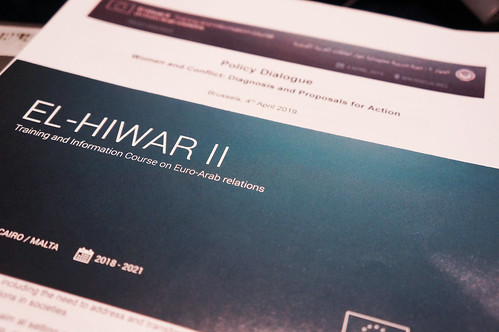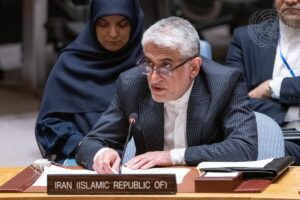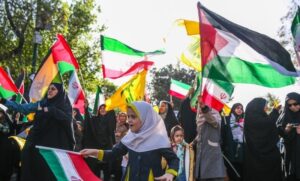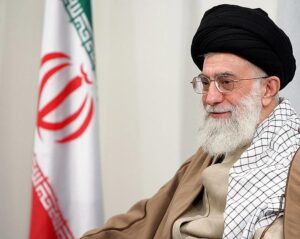From July 12 to 17, 2021, Desirée Custers, Research Assistant with Stimson Center’s Middle East and North Africa program, took part in the El-Hiwar II Summer School organized by the College of Europe and funded by the European Union (EU). The Summer School, which was held online, brought together 20 young participants from Europe and the Arab region from different professional backgrounds, including civil society, governments, institutions, and the arts scene, who engaged in a five-day program of lectures and workshops.
The focus of the Summer School was on Euro-Arab people-to-people (p2p) exchange, and discussed topics such as Euro-Arab relations, migration, and youth, and provided workshops on among others fundraising and intercultural skills. This field note is a reflection on the El-Hiwar II Summer School, specifically the topic of how Euro-Arab p2p exchange has been conducted in the context of Euro-Arab relations and what their potential is for the future.
Euro-Arab p2p relations in a nutshell
P2p relations entail interaction between normal citizens from different regions or countries and can take place in a wide range of fields such as culture, sport, tourism, education, civil society, research, and economy. They are an important element in building cross-regional networks and increasing mutual understanding, and can have a political influence.
Euro-Arab p2p exchange have been undertaken in the larger framework of Euro-Arab relations, with which this field note means relations between the EU and countries and institutions in the Arab region. Yet p2p exchange has often been considered a secondary soft politics tool, and the different phases of Euro-Arab relations have generally prioritized economic and security issues.
P2p has often been considered a secondary soft politics tool, and the different phases of Euro-Arab relations have often prioritized economic and security issues
The first phase of Euro-Arab relations, the Euro-Arab Dialogue (from 1973 to 1989), for example focused on economic, financial, and energy topics as well as the Palestinian question. The following Mediterranean Policy (from 1990 to 1996) introduced new elements to Euro-Arab relations, such as p2p exchange through decentralized initiatives, while the 1995 Euro-Mediterranean Partnership (EMP), or Barcelona Process, continued the focus on political, economic, and security topics in addition to intercultural dialogue.
After the European Neighborhood Policy (ENP) came into being in 2004, interculturality decreased in importance and Euro-Arab relations were increasingly seen through a security paradigm, especially following the terrorist attacks in Madrid (2004) and London (2005) and the increasing irregular migration flows to the EU. A 2015 strategic dialogue between the EU and Arab League, for example, saw the signing of a Memorandum of Understanding focused on political and security matters, followed by the first EU-Arab League summit in 2019 which emphasized cooperation on security matters and common challenges such as migration, cultural and religious intolerance, extremism, and stereotyping.
To summarize, the different Euro-Arab initiatives mentioned above have to a more or lesser extent implemented p2p exchange. However, the focus of Euro-Arab relations has largely been on economic and political topics. Since the turn of the century, relations have increasingly become securitized and there has been a progressive hollowing out of intercultural Euro-Arab p2p dialogue.
Euro-Arab p2p Relations: what is needed?
Several insights were shared during the Summer School when it comes to the implementation of Euro-Arab p2p projects. First, the field of Euro-Arab p2p dialogue has been considered by both regions as an arena to “show the best of us”, while there was no real picture of “the worst of us”. P2p initiatives were used to show how tolerant and open to the other each region was, but that idea imploded when reality kicked in. Linked to this is the fact that p2p dialogue was described to be elitist and often included the repeated participation of the same category of people from both regions, people who are often already open to one another.
Furthermore, Euro-Arab dialogue was mentioned to be mainly reactive and conducted from a Eurocentric point of view. As such, it has mostly focused on security issues and topics determined through an “orientalist approach” (often women and religion). Missing have been topics of inclusive interculturality (including those of popular culture, identity, and religion) and addressing long-existing mutual negative perceptions and intersectional discrimination.
Third, there is an important hurdle to p2p exchange when it comes to the mobility of the people in both regions. One example is an imbalance in the implementation of educational programs. While people from the Arab region go to Europe to follow their education, the other way around is not often the case. Yet at the same time, it is very difficult for ordinary people from the Arab region to travel to Europe for tourism or other types of visits, while Europeans can often easily visit countries in the Arab region.
Based on these insights, the following recommendations could help shape Euro-Arab p2p exchange in the future:
- The promotion of less elitist Euro-Arab p2p dialogues through engaging a wider scope of organizations, institutions, and people from Europe and the Arab region.
- A de-securitization of Euro-Arab p2p dialogue by including topics of inclusive interculturality and discussions on negative mutual perceptions.
- The implementation of p2p relations away from a Euro-centric approach and towards an equal Euro-Arab partnership.
- The inclusion of journalists and social media influencers in p2p dialogues and media training on avoiding mutual negative portrayals.
- The use of p2p relations to encourage joint efforts (such as restoration efforts or joint documentaries) that bridge the gap between the two regions.
- The use of p2p projects to increase mobility to and from both regions.
Conclusion: Euro-Arab p2p relations and the Stimson Center
As this fieldnote shows, there has been a long history of political and economic Euro-Arab relations, but p2p exchange has remained an underexplored domain. It became clear during the El-Hiwar II Summer School that there is a need for stronger EU-Arab cooperation on common areas of concern such as the environment, sustainable economies, migration, gender, education, youth, and the development of entrepreneurship. As these common priorities have not yet been explored enough, p2p exchange can help shape new and effective policies, especially by including the younger populations, diasporas, and binational citizens.
P2p exchange can significantly help shape new and effective policies
The Summer School in itself was already an example of how inclusive p2p dialogue can be conducted, with young participants from different backgrounds meeting, and bringing to light and discussing the topics mentioned above. Each of us will take this valuable information to our workplace, where many of us deal with Euro-Arab relations. As for the Stimson Center, the Middle East and North Africa program has been aware of the value of p2p dialogue and has conducted p2p exchange between Saudi’s and Iranians in its Iran – Saudi dialogue. It has also included a p2p component in its work in Iraq and its neighbors. With this background, in addition to Stimson Europe’s (Stimson Center’s Brussels office) close ties to the Brussels community, it is in good position to investigate options for implementing a Euro-Arab or Euro-MENA p2p dialogue projects in the future.




